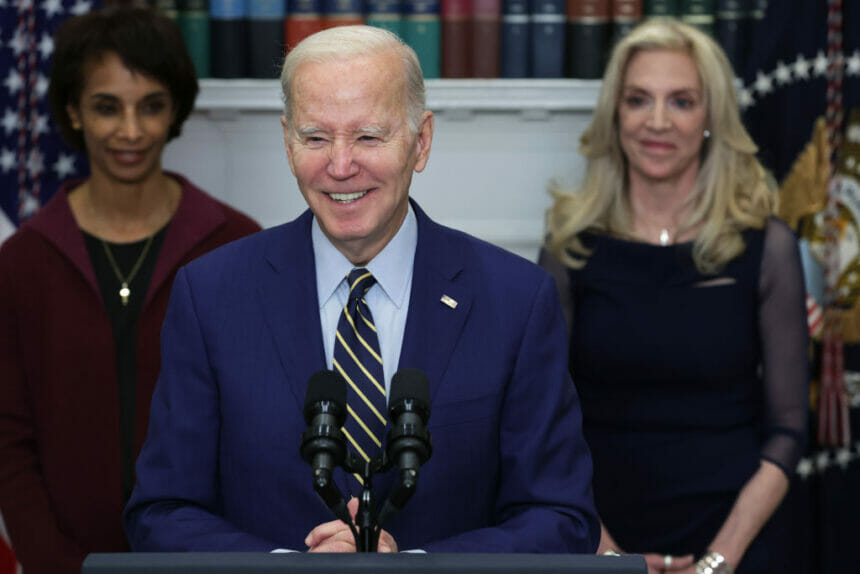President Joe Biden unveiled his 2024 budget proposal this week, outlining policies that seek to reduce the deficit, enact higher taxes on the wealthy and lower healthcare costs for Americans.
In particular, the budget includes a number of healthcare-related items — including continuing the fight to lower drug costs, improving pandemic preparedness, expanding access to healthcare and boosting behavioral health services.
“The president believes that health care should be a right, not a privilege,” the White House said in a statement.
The budget proposal includes $144.3 billion in discretionary funding and $1.7 trillion in mandatory funding for the Department of Health and Human Services.
Those funds would be directed toward “critical, targeted investments in the American people that will improve health and well-being,” the HHS noted in a statement.
“Specifically, these investments will address urgent needs to lower drug costs, bolster public health preparedness, improve the health and well-being of children and seniors, make child care affordable, expand access to healthcare, increase the healthcare workforce, and advance research underlying medicine, public health and social services,” the statement read.
Below is a roundup of some of the main healthcare items in the proposed budget.
Reducing drug prices
Perhaps the most notable part of the budget proposal is the White House’s desire to build on the $740 billion Inflation Reduction Act.
Signed into law last summer, the legislation included historic drug pricing reforms that gave the federal government the ability to negotiate Medicare prices on certain drugs. Negotiations for 10 drugs would go into effect in 2026, with the number rising to 26 in 2029.
The move was considered a win among drug pricing reduction advocates — though the pharma industry had a different idea. Lobbying group PhRMA argued the provisions would be a “tragic loss for patients.”
Still, there’s a continued push for even more drug pricing regulation from certain lawmakers, including Sen. Bernie Sanders, (I-Vt.), who has cited the issue as one of his first priorities in leading the Senate Health, Education, Labor and Pensions (HELP) Committee.
The 2024 budget would also aim to strengthen Medicare’s new negotiating powers by expanding it to apply to more drugs, including more recently-approved drugs. In particular, the Biden administration wants to increase the number of drugs Medicare can negotiate in 2026 from 10 to 20.
The budget also proposed limiting Medicare Part D cost-sharing for generic drugs that treat specific chronic conditions, including hypertension, to $2. Finally, the budget calls for insulin to be capped at $35, following on Biden’s remarks during the State of the Union and Eli Lilly’s recent decision to enact a price cap.
Extending Medicare solvency
The 2024 budget also includes a proposal to extend Medicare trust fund solvency, or the amount of assets through which Part A benefits are paid.
Starting in 2023 and in the coming years, Medicare Part A spending will exceed income to the trust fund — which is typically financed from general revenues, payroll tax revenues and beneficiary premiums. This will ultimately lead to a depletion of assets in the Part A trust fund, according to an analysis by the Kaiser Family Foundation.
The Biden administration is suggesting a variety of ways to tackle the solvency dilemma, which is beleaguered by rising healthcare costs as well as an aging population.
The 2024 budget would extend Medicare solvency by 25 years by using revenues from the net investment income tax and increasing the Medicare tax rate on incomes above $400,000.
The efforts to lower prescription drug prices also play into this, as the government would direct savings from those measures to the trust fund and strengthen the rules around drug companies paying rebates to Medicare if they raise drug prices faster than inflation.
Pandemic preparedness
With the COVID-19 public health emergency set to end in May, the federal government is still grappling with ways to bolster public health preparedness for future health crises or pandemics.
Biden’s 2024 budget includes a proposal to increase funds to national agencies that would be responsible for meeting future health crises.
That involves $20 billion in mandatory funding for the Administration for Strategic Preparedness and Response, the Centers for Disease Control and Prevention and the Food and Drug Administration. It would also put aside $1 billion for the Biomedical Advanced Research and Development Authority.
More funds would be directed to the Strategic National Stockpile for vaccines and drugs, into long-term abilities to foster rapid responses to biological threats and $10.5 billion for the CDC to specifically ramp up its data, workforce and lab capacity.
Mental health care
In light of the nation’s ongoing and worsening mental health crisis, the budget also includes investments in behavioral health services. This is an area that’s received increased scrutiny in recent years, due to the high rates of mental illness across the U.S. as well as a severe psychiatrist and therapist shortage.
Mental health care provisions in the budget would include $836 million to the federal government’s newly-launched 988 hotline, including an expansion with 988 local crisis centers and community providers. Another $200 million will also be directed toward National Institutes of Health funding to focus on innovative mental health research.
Despite these ambitious provisions and more included in the 2024 budget, however, it would take a great deal of bipartisan power for many of them to pass Congress. That’s due to the narrowly divided Congress — which will likely leave many big policy changes in gridlock, health policy wonks predicted at the end of last year.








